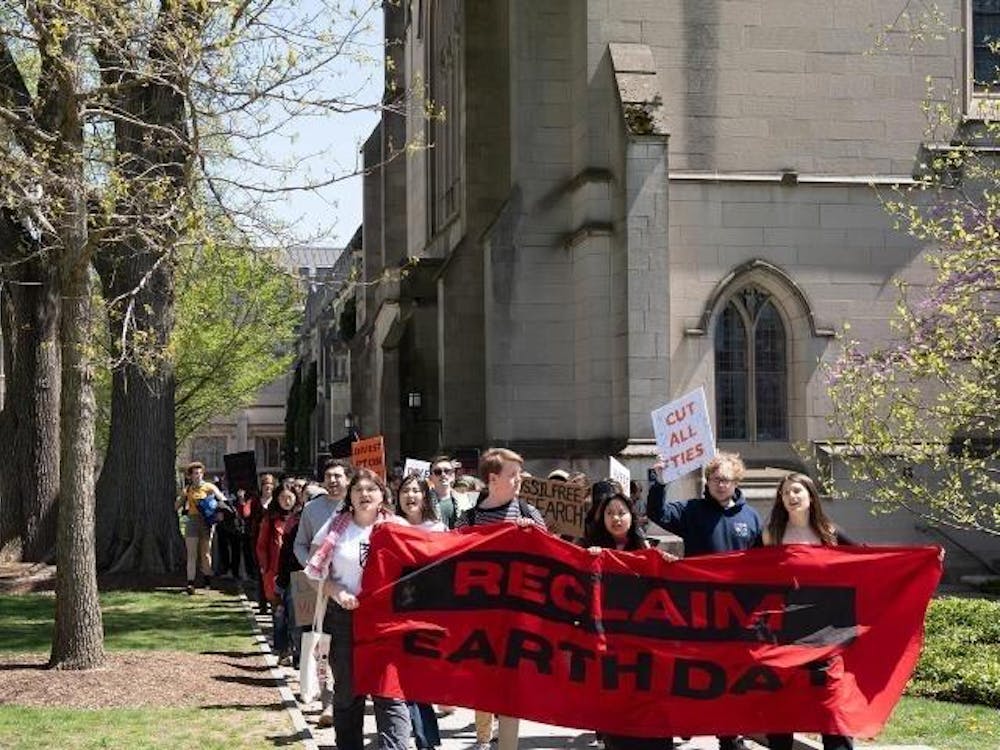Before his lecture at the Wilson School, titled “Twenty Years After Oslo: Lessons Learned and Future Options?”, Maen Rashid Areikat, the chief representative of the delegation of the Palestinian Liberation Organization to the United States, sat down with The Daily Princetonian to discuss his work and the ongoing peace talks between Israel and Palestine facilitated by the United States.
Daily Princetonian: Could you start out by briefly describing what your job entails and how it’s different from being an ambassador from a country recognized by the United States?
Maen Rashid Areikat: My duties are similar to the duties of any other ambassador based in Washington, D.C. The fact that the United States does not recognize Palestine as a full-fledged state and does not provide us with diplomatic privileges— full diplomatic privileges —does not change the diversity of our activities. We do a different kind of work — we reach out to the government administration, Congress, think tanks, American NGOs, minorities in the American policy community, the Jewish community — so basically we act similarly to other embassies based in Washington, D.C.
DP: How have you viewed the situation in your own country differently since you returned from your education in the United States?
MRA: It’s been quite some time since I finished my education here, but I think it’s natural that people always get attached to their homeland. But living here, going to school here, helped me to broaden my horizons to see how such a large country functions and operates. It was a very useful experience in that, preparing me for my future career. When I went back — I mean, things don’t seem to change as fast in my country as in other countries. The United States is always in the fast lane, and therefore, you feel the difference between how things move fast in this country, compared to other countries.
DP: On Thursday, Ami Ayalon, former head of the Shin Bet, stated he didn’t trust Netanyahu’s willingness to achieve a two-state solution, and then on the same day, the housing minister of Israel, [Uri] Ariel, was also quoted stating, “All the area located to the west of the Jordan River is owned by Israel and it will continue to be under Israeli control forever.” In this context, do you think that the current peace negotiations are futile? Are you expecting any greater concessions than what the Israelis are able to offer?
MRA: First of all, Israel is occupying the Palestinian territories illegally and in violation of international law and in violation of existing agreements that we signed with them almost twenty years ago. So if Israel decides to withdraw, they would do so under compliance with international law and in compliance with UN resolutions, so that would not be considered a concession. We have made that very concession in 1988 when we accepted the establishment of the Palestinian state in the West Bank and in Jerusalem, which is 22 percent of what used to be historic Palestine
As with these statements and counter-statements, I know who Ami Ayalon is, I respect his opinions because he has a security and military background and he understands the cost of continued conflict with the Palestinians and with Israel's neighbors. They are people who are looking to the future. Unfortunately, the housing minister, who is a member of Israel HaBayit, you know, the Jewish house or home, is on the extreme right of the Israeli political system, and they are the people who are living in the past. So Israel today is in a fight between those who are aspiring to have a better future, a safe future, a secured future for Israel and the Middle East, and those who wish to keep living in and dwelling on the past without moving forward.
DP: So what kind of momentum do you see happening right now? Do you see the negotiations moving forward towards any progress?
MRA: Well, it's too early to predict the course — it’s only been two months exactly sincethepolitical process was resumed — and I think it’s too early to judge, but the Palestinians are ready, willing and capable of engaging the Israelis. I think we want to see serious engagement on the part of the Israelis to put an end to this conflict.
DP: Palestine was recently upgraded to an observer state in the UN. You used it as a bargaining chip in prisoner release negotiations. The Globe and Mail quoted Dr. [Mustafa] Barghouti as saying that you should have used this to negotiate a settlement construction freeze. Do you think that the PLO has negotiated effectively?
MRA: Well, I think, given the existing circumstances, the PLO managed to get what they could get, because you have to understand, the geopolitical conditions in the Middle East right are very complex, very complicated right now, especially for the Palestinians. I think we all want to see a freeze of the settlement activities, because they are illegal, illegitimate, violate international law, the Fourth Geneva Convention of 1949, and we always, all the time, try to convince Israel and use other parties to convince Israel to cease their settlement activities, but, you know, there are always many elements, many ingredients involved in any kind of discussions, and when you are discussing with a powerful adversary like Israel who occupies your land and controls your life, it's not very easy always to get things out of them. We will keep trying to achieve our objectives.

DP: President Obama listed resolving the Israeli-Palestinian conflict as one of the main foreign policy priorities of his second term. The New York Times recently described both Israel and Palestine as “artful” at delaying negotiations. Do you think an agreement is more likely under the Quartet structure that's resumed talks, with the [United States] involved, or do you think that an eventual agreement would be resolved with Israel and Palestine alone, or with Egypt as a key player?
MRA: Right now, we are seeing the [United States]being an active intermediary and facilitator like they callthemselvesin the current political negotiations, but I don’t see the role of the Quartet being transformed anytime soon into the role of the United States. The [United States] will continue to play that important role, because they have good relations with both sides, so as for bilateral versus trilateral, multilateral, and it's the Palestinians and Israelis who will sign any future peace agreement to end the conflict, and therefore the bilateral track is important, but for any agreement to succeed, we need the support of third parties, and definitely for any agreement to be sustained and preserved, we need third countries to play a role in order to guarantee that whatever agreement is reached will be preserved and sustained. International, European, [United States], even regional, like Egypt, Jordan and others, are very key players in the future.
DP: The Palestinian National Authority under the Oslo Accords was meant to be a governing body for five years, and it remains 18 years later. Do you think that there's going to be a new framework any time soon?
MRA: It’s been 20 years since the Oslo Accords were signed, and the Palestinian Authority was established and took control of the first chunk of Palestinian land in 1994, and five years later, the permanent status negotiations were supposed to have been concluded. Unfortunately, this did not happen for many reasons, and today, the most important thing for us is that we will not accept any more interim transitional agreements. We will not accept a state with provisional authority. We want a total resolution to the conflict dealing with all the core issues, all the fundamental issues, solving them once and for all, ending the conflict. This is what we are seeking. We will not settle for an interim agreement. We learned from the Oslo experience, but at the same time, I don't think we have the luxury of waiting for many more years to see an end to this military occupation, to see our people obtaining freedom and independence.
DP: Do you think the Oslo Accords were a mistake?
MRA: No, I cannot call them being a mistake. I think the Oslo Accords were a serious attempt on the part of the Israelis and Palestinians to end their decades-long conflict, but unfortunately, it was not implemented as it was expected to. One can argue about the reasons for that. There were so many reasons for that. The spirit and the letter of the agreement were not implemented. Israel continued to plant illegal settlements, to consolidate existing settlements and unfortunately, extremists on both sides hijacked the process and forced the political leaders in Israel and Palestine to derail the political process.
DP: Do you think that a Palestine that has permanent, internationally recognized borders would be tenable through the Israeli political process?
MRA: Until today, the majority of Israelis are in favor of a two-state solution, so are the majority of the Palestinian people. The two-state solution seems to be the only viable solution for the conflict. Otherwise, thinking about the continued status quo is really, really nightmarish, I think, because we are witnessing more discrimination by the Israelis against the Palestinians, and there are settlers who are living amongst Palestinian civilians in the occupied territories who have their own regime and semi-autonomous areas protected by the Israeli army. You have the occupation, you have Palestinian areas, so you have the West Bank divided in three areas of governance, and the discrimination against the Palestinians, and what that could lead to in the future. Some argue that it could lead to an apartheid-like state in which the Palestinians would be discriminated against. This status quo cannot be sustained. And on the other side, if you don't want a two-state solution, do you want one binational state whose Muslims, Christians can live together in one country under one state and can be given equal rights? Again, I don’t think the Israelis will be giving Palestinians equal rights, and therefore, our struggle will be transformed from a political struggle to a social justice struggle.
DP: If you had to pick the major obstacle preventing the Israelis and Palestinians from reaching a two-state solution, what would that be?
MRA: I think it’s the lack of Israeli seriousness about ending the conflict and the false assumption that the status quo can be maintained, and that as long as Israel can be secured, that as long as there are no threats against Israel, as long as Israel is the strongest power in the region, as long as things on the Palestinian front are quiet, no attacks against Israelis, as long as their economy is progressing and prospering, why should we rush into having an agreement with the Palestinians? This is a very dangerous premise, because it does not take into account the fact that the Palestinian people are determined to end this status quo and to end the Israeli occupation, reaching to independence and the establishment of a sovereign independent Palestinian state. And if the Israelis are not willing to sit and discuss and enter the conflict today, I am afraid that in the future certain external factors, maybe, will come into play to somehow confuse the situation in a way that Israelis will not be able to choose a very favorable agreement that would guarantee their security and prosperity in the future. So the sooner they do it, the better off everybody will be.
DP: Final question. Palestine has an unemployment rate of 27.5 percent as of 2013, and it’s ranked 135th by the World Bank in ease of doing business. What is being done to attract multinational companies to Palestine, and what does Palestine have to offer to the global business community?
MRA: We have to offer a lot to the global business community, but you have to understand how difficult it is to be controlled by another power, and the Israelis have control over our international course of goods, they control the movement of goods, services and individuals. There are so many restrictions. They exploit our economy, they export three times or four times as much as we export to them, we are one of their largest markets, so I’m not saying that all our economic ills should be blamed on the Israeli side, but I think that if the Israeli occupation ended, if Palestine is an independent state, we can definitely exploit our potential, increase investment, improve our economy and be able to lower these figures that you mentioned now, but when you have to fight on different fronts, political, economic, security, social, internal, we are a small nation, and the odds and the challenges are very difficult. So an end to the Israeli occupation will definitely improve our situation significantly.








